Dahua PoE Cameras
Dahua Technology is a Chinese manufacturer that specializes in video surveillance equipment, including IP cameras, network video recorders (NVRs), and other security products. Dahua's PoE (Power over Ethernet) cameras are part of their lineup of IP cameras designed for various surveillance applications.
Dahua PoE Camera Key Features
- Power over Ethernet (PoE): Dahua PoE cameras are designed to be powered and connected to the network using a single Ethernet cable. This simplifies installation and reduces the need for additional power cables.
- High Definition (HD) and Ultra HD (4K) Resolution: Dahua offers a wide range of PoE cameras with different resolutions, including HD (720p or 1080p) and Ultra HD (4K) options. The choice of resolution depends on your specific surveillance needs.
- Varifocal and Fixed Lenses: Dahua PoE cameras come with varifocal or fixed lenses, allowing you to choose the right lens type for your application. Varifocal lenses offer adjustable zoom and focus for flexibility in capturing various scenes.
- Infrared (IR) Night Vision: Many Dahua PoE cameras are equipped with IR LEDs for night vision capabilities. This allows the cameras to capture clear images in low-light or complete darkness.
- Weatherproof and Durability: Dahua PoE cameras are often designed to withstand various weather conditions and are rated for outdoor use. They are built with rugged materials to ensure durability.
- Smart Features: Dahua PoE cameras may include advanced features such as motion detection, intelligent video analytics, facial recognition, and license plate recognition to enhance security and provide valuable insights.
- Remote Viewing and Mobile Apps: Dahua provides mobile apps and software solutions that allow users to remotely monitor and manage their PoE cameras from smartphones, tablets, or computers.
- Integration: Dahua's products are often compatible with third-party video management systems (VMS) and access control systems, allowing for integration with existing security infrastructure.
- ONVIF Compatibility: Many Dahua PoE cameras are ONVIF compliant, which means they can work with other ONVIF-compatible devices and software, providing interoperability.
- Storage Options: Dahua PoE cameras can store video footage locally on an NVR or on the cloud, depending on the chosen configuration.
What is a PoE camera?
A PoE camera, or Power over Ethernet camera, is a type of surveillance camera that can receive both data and power over a single Ethernet cable. This technology simplifies the installation process and reduces the need for separate power cables, making it a popular choice for IP (Internet Protocol) security cameras and networked devices.
Read Details: What is PoE Camera? Ultimate Guide
What should i buy Dahua Poe Cameras?
Deciding to purchase Dahua PoE cameras for your surveillance needs can be a good choice, but there are several factors to consider before making a purchase. Here's a step-by-step guide to help you decide what Dahua PoE cameras to buy:
- Determine Your Surveillance Needs:
- Identify the specific areas or locations you want to monitor.
- Consider whether you need indoor or outdoor cameras.
- Assess the lighting conditions (day and night) in the areas where you plan to install cameras.
- Think about the desired camera resolution (e.g., HD, Full HD, 4K) based on your monitoring requirements.
- Camera Types:
- Dahua offers a wide range of PoE camera types, including dome cameras, bullet cameras, PTZ cameras, and more. Choose the camera type that suits your installation and coverage needs.
- Camera Features:
- Review the features offered by different Dahua PoE camera models, such as IR night vision, motorized zoom lenses, wide dynamic range (WDR), and advanced analytics. Select features that align with your surveillance goals.
- PoE Switch and Power Considerations:
- Ensure you have a PoE switch or injector to provide power to the cameras. Check the power requirements of the cameras and make sure your PoE equipment can supply the necessary power.
- Budget:
- Determine your budget for the surveillance system, including cameras, NVR (Network Video Recorder), and any additional accessories or services you may need.
- Compatibility and Integration:
- If you already have existing security equipment or plan to expand your system in the future, check compatibility and integration options with other devices and software.
- Local Regulations and Privacy:
- Be aware of local regulations and privacy laws related to surveillance cameras. Ensure that your camera installations comply with these regulations.
- Installation and Maintenance:
- Consider whether you have the technical skills to install and maintain the cameras yourself or if you need professional installation services.
- Network Infrastructure:
- Assess your existing network infrastructure to ensure it can handle the additional bandwidth requirements of the cameras. You may need to upgrade your network if necessary.
- Research and Reviews:
- Read reviews and gather information from reputable sources about the specific Dahua PoE camera models you're interested in. Look for feedback from other users and professionals.
- Warranty and Support:
- Check the warranty and support options provided by Dahua for their cameras. Knowing that you have access to support in case of issues can be reassuring.
- Purchase from Authorized Dealers:
- Buy Dahua PoE cameras from authorized dealers or distributors to ensure you receive genuine products and have access to manufacturer support.
Once you've considered these factors and determined your specific needs, you can make an informed decision about which Dahua PoE cameras are the best fit for your surveillance requirements.
-
Discontinued

Dahua 1A404XBNR 4MP Outdoor Mini PTZ IP Security Camera with 2.8~12mm Lens, WizSense Series
Brand: Dahua
Part Number: 1A404XBNR- Compression : H.265, Smart H.265 Plus, H.264 Plus, H.264B, H.264M, H.264H, MJPEG,
- Field of View (Horizontal) : 96.9°Field of View 31.6°Field of View
- Max. FPS and Resolution : 30fps at 2560 x 1440
- Lens Type : Motorized (Automatic Zoom) Lens
- Lens Size : 2.8~12mm Lens
- Sensor Type : CMOS
- Sensor Size : 1/2.8" Sensor
- Max. Storage Capacity : 256 GB Storage Capacity
- Protection Code : IP66 IK08
- Color : White
- Environmental : Outdoor
- Aperture : F1.8 F2.7
-
Discontinued
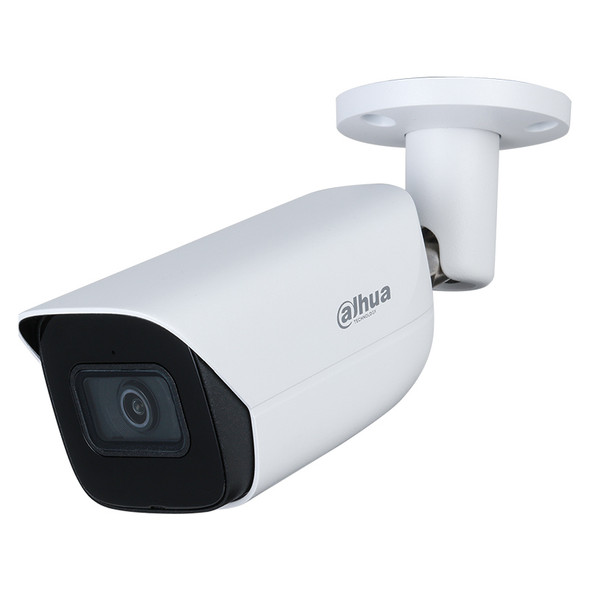
Dahua N43AB52 4MP Night Vision Bullet IP Security Camera with Starlight, Built-in Microphone, H.265+, Arctic
Brand: Dahua
Part Number: N43AB52- Compression : H.265 Plus,
- Sensor Type : CMOS
- Sensor Size : 1/3" Sensor
- Protection Code : IP67
- Environmental : Outdoor
- Audio Support : Built-in Microphone
-
Discontinued

Dahua N43AF5Z 4MP IR H.265+ Outdoor Bullet IP Security Camera with Starlight, Analytics+
Brand: Dahua
Part Number: N43AF5Z- Compression : H.265 Plus,
- Lens Type : Motorized (Automatic Zoom) Lens
- Lens Size : 2.7~13.5mm Lens
- Sensor Type : CMOS
- Sensor Size : 1/3" Sensor
- Protection Code : IP67
- Environmental : Outdoor
-
Discontinued

Dahua 49425XBNR 4MP IR H.265+ Outdoor PTZ IP Security Camera with 25x Optical Zoom, WizSense
Brand: Dahua
Part Number: 49425XBNR- Compression : H.265 Plus,
- Field of View (Horizontal) : 60°Field of View 2.5°Field of View
- Lens Type : Motorized (Automatic Zoom) Lens
- Lens Size : 4.8~120mm Lens
- Sensor Type : CMOS
- Sensor Size : 1/2.8" Sensor
- Max. Storage Capacity : 256 GB Storage Capacity
- Protection Code : IP67
- Environmental : Outdoor
-
Discontinued
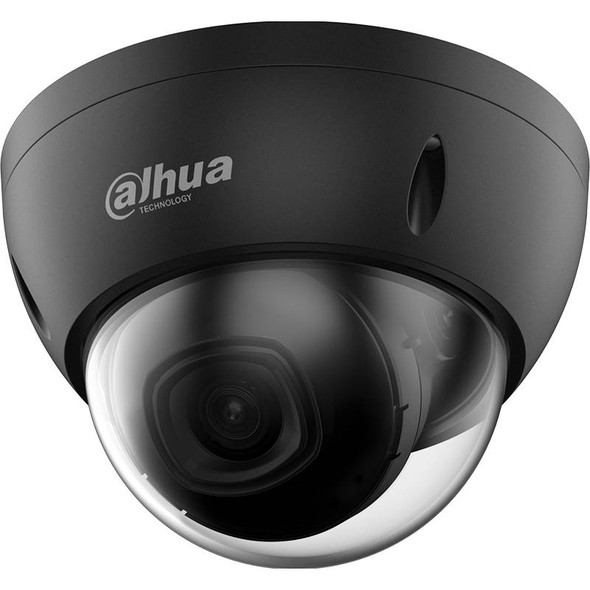
Dahua N43AL52-B 4MP IR H.265 Outdoor Starlight Dome IP Security Camera with 2.8mm Lens
Brand: Dahua
Part Number: N43AL52-B- Compression : H.265,
- Field of View (Horizontal) : 103°Field of View
- Lens Type : Fixed Lens
- Lens Size : 2.8mm Lens
- Sensor Type : CMOS
- Sensor Size : 1/3" Sensor
- Max. Storage Capacity : 256 GB Storage Capacity
- Protection Code : IP67
- Color : Black
- Environmental : Outdoor
-
Discontinued
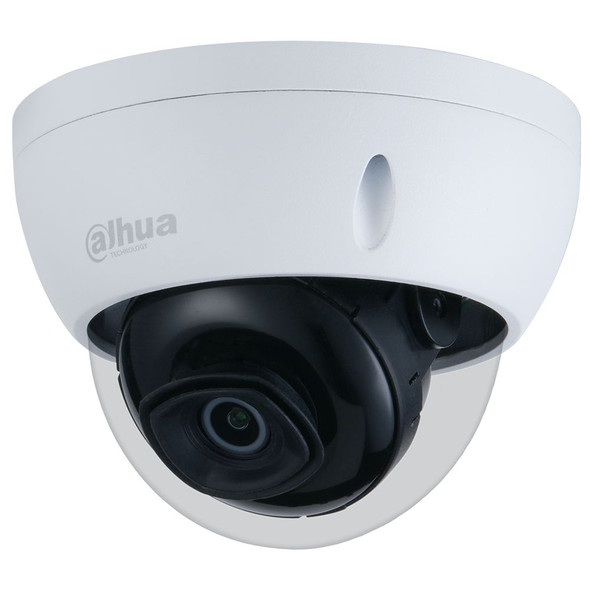
Dahua N53AL52 5MP IR Starlight Outdoor Dome IP Security Camera with Smart Motion Detection
Brand: Dahua
Part Number: N53AL52- Compression : Smart H.265 Plus,
- Field of View (Horizontal) : 98°Field of View
- Lens Type : Fixed Lens
- Lens Size : 2.8mm Lens
- Sensor Type : CMOS
- Sensor Size : 1/2.7" Sensor
- Protection Code : IP67
- Environmental : Outdoor
-
Discontinued
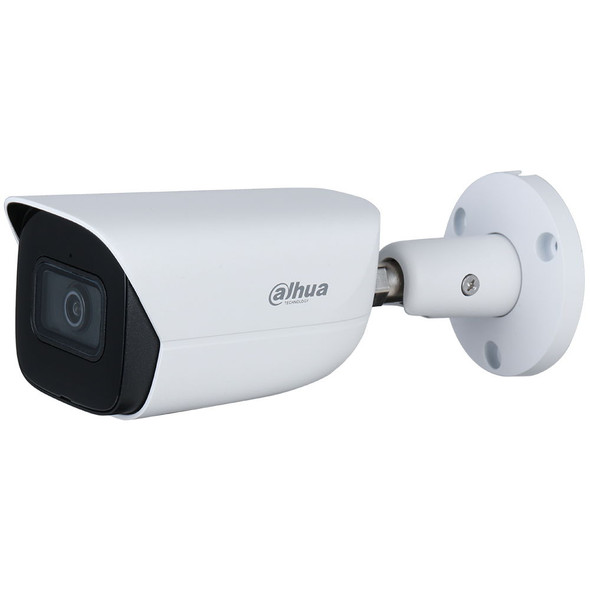
Dahua N53AB52 5MP Night Vision Starlight Outdoor Bullet IP Security Camera with Smart Motion Detection
Brand: Dahua
Part Number: N53AB52- Compression : Smart H.265 Plus,
- Field of View (Horizontal) : 98°Field of View
- Lens Type : Fixed Lens
- Lens Size : 2.8mm Lens
- Sensor Type : CMOS
- Sensor Size : 1/2.7" Sensor
- Protection Code : IP67
- Environmental : Outdoor
- Audio Support : Built-in Microphone
-
Discontinued

Dahua N24BN52 2MP IR H.265+ Dome Outdoor IP Security Camera
Brand: Dahua
Part Number: N24BN52- Compression : H.265,
- Field of View (Horizontal) : 110°Field of View
- Lens Type : Fixed Lens
- Lens Size : 2.8mm Lens
- Sensor Type : CMOS
- Sensor Size : 1/2.8" Sensor
- Protection Code : IP67
- Environmental : Outdoor
- Audio Support : Built-in Microphone
-
Discontinued

Dahua N24CL52 2MP IR ePoE Outdoor Dome IP Security Camera
Brand: Dahua
Part Number: N24CL52- Compression : H.264, H.265 Plus,
- Field of View (Horizontal) : 58°Field of View 110°Field of View
- Max. FPS and Resolution : 60fps at 1080P
- Lens Type : Fixed Lens
- Lens Size : 2.8mm Lens
- Sensor Type : CMOS
- Sensor Size : 1/2.8" Sensor
- Protection Code : IP67 IK10
- Color : White
- Environmental : Outdoor
-
Discontinued
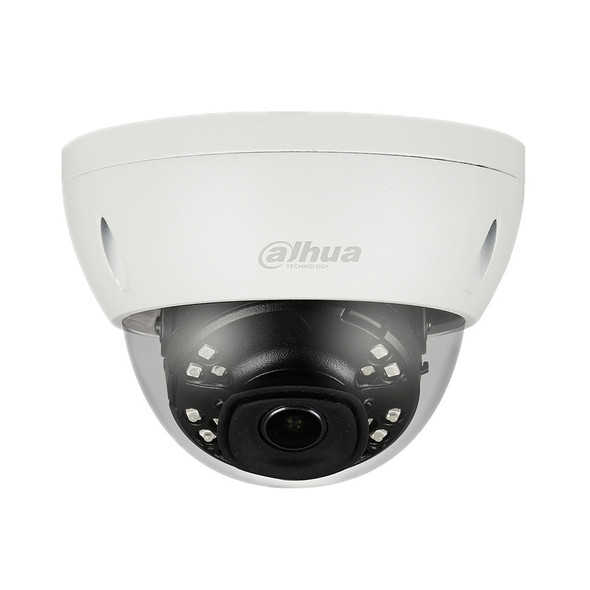
Dahua N84CL52 8MP 4K IR ePoE Outdoor Dome IP Security Camera
Brand: Dahua
Part Number: N84CL52- Compression : H.264 Plus, H.265 Plus,
- Field of View (Horizontal) : 68°Field of View 110°Field of View
- Max. FPS and Resolution : 15fps at 3840 x 2160
- Lens Type : Fixed Lens
- Lens Size : 2.8mm Lens
- Sensor Type : CMOS
- Sensor Size : 1/2.5" Sensor
- Protection Code : IP67 IK10
- Color : White
- Environmental : Outdoor
-
Discontinued

Dahua N84CG52 8MP 4K IR ePoE Outdoor Eyeball IP Security Camera
Brand: Dahua
Part Number: N84CG52- Compression : H.265 Plus, H.264,
- Field of View (Horizontal) : 69°Field of View 48°Field of View
- Max. FPS and Resolution : 20fps at 3072 x 2048
- Lens Type : Fixed Lens
- Lens Size : 2.8mm Lens
- Sensor Type : CMOS
- Sensor Size : 1/2.5" Sensor
- Protection Code : IP67
- Color : White
- Environmental : Outdoor
- Audio Support : Built-in Microphone
-
Discontinued
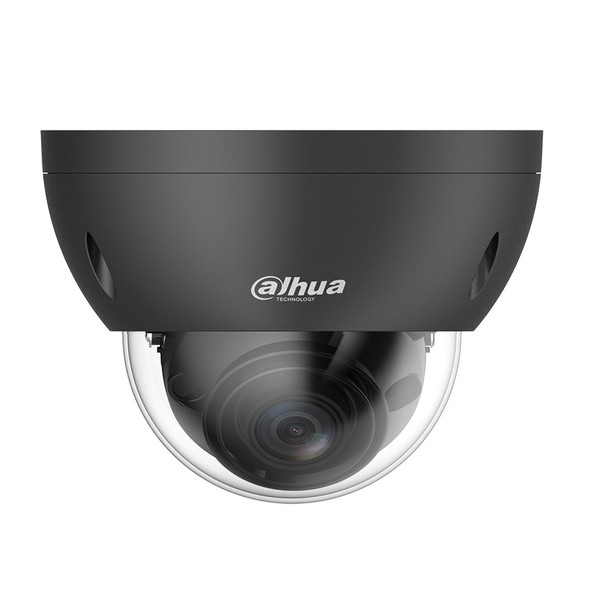
Dahua N45CL5Z-B 4MP IR ePoE Outdoor Dome IP Security Camera
Brand: Dahua
Part Number: N45CL5Z-B- Compression : H.264, H.265 Plus,
- Field of View (Horizontal) : 31°Field of View 106°Field of View
- Max. FPS and Resolution : 30fps at 2688 x 1520
- Lens Type : Motorized (Automatic Zoom) Lens
- Lens Size : 2.7~13.5mm Lens
- Sensor Type : CMOS
- Sensor Size : 1/3" Sensor
- Protection Code : IP67 IK10
- Color : Black
- Environmental : Outdoor
